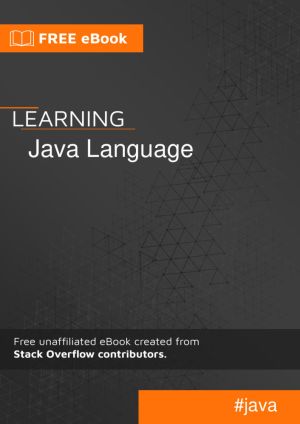Learning Java
by Stack Overflow Community
DescriptionTable of ContentsDetailsHashtagsReport an issue 






Book Description
Java is a class-based, object-oriented programming language that is designed to have as few implementation dependencies as possible. It is an unofficial and free Java ebook created for educational purposes. All the content is extracted from Stack Overflow Documentation, which is written by many hardworking individuals at Stack Overflow.This open book is licensed under a Creative Commons License (CC BY-SA). You can download Learning Java ebook for free in PDF format (6.9 MB).
Table of Contents
Chapter 1
Getting started with Java Language
Chapter 2
2D Graphics in Java
Chapter 3
Alternative Collections
Chapter 4
Annotations
Chapter 5
Apache Commons Lang
Chapter 6
AppDynamics and TIBCO BusinessWorks Instrumentation for Easy Integration
Chapter 7
Applets
Chapter 8
Arrays
Chapter 9
Asserting
Chapter 10
Atomic Types
Chapter 11
Audio
Chapter 12
Autoboxing
Chapter 13
Basic Control Structures
Chapter 14
Benchmarks
Chapter 15
BigDecimal
Chapter 16
BigInteger
Chapter 17
Bit Manipulation
Chapter 18
BufferedWriter
Chapter 19
ByteBuffer
Chapter 20
Bytecode Modification
Chapter 21
C++ Comparison
Chapter 22
Calendar and its Subclasses
Chapter 23
Character encoding
Chapter 24
Choosing Collections
Chapter 25
Class - Java Reflection
Chapter 26
Classes and Objects
Chapter 27
Classloaders
Chapter 28
Collection Factory Methods
Chapter 29
Collections
Chapter 30
Command line Argument Processing
Chapter 31
Common Java Pitfalls
Chapter 32
Comparable and Comparator
Chapter 33
CompletableFuture
Chapter 34
Concurrent Collections
Chapter 35
Concurrent Programming (Threads)
Chapter 36
Console I/O
Chapter 37
Constructors
Chapter 38
Converting to and from Strings
Chapter 39
Creating Images Programmatically
Chapter 40
Currency and Money
Chapter 41
Date Class
Chapter 42
Dates and Time (java.time.*)
Chapter 43
Default Methods
Chapter 44
Dequeue Interface
Chapter 45
Disassembling and Decompiling
Chapter 46
Documenting Java Code
Chapter 47
Dynamic Method Dispatch
Chapter 48
Encapsulation
Chapter 49
Enum Map
Chapter 50
Enum starting with number
Chapter 51
Enums
Chapter 52
EnumSet class
Chapter 53
Exceptions and exception handling
Chapter 54
Executor, ExecutorService and Thread pools
Chapter 55
Expressions
Chapter 56
File I/O
Chapter 57
FileUpload to AWS
Chapter 58
Fluent Interface
Chapter 59
FTP (File Transfer Protocol)
Chapter 60
Functional Interfaces
Chapter 61
Generating Java Code
Chapter 62
Generics
Chapter 63
Getters and Setters
Chapter 64
Hashtable
Chapter 65
HttpURLConnection
Chapter 66
Immutable Class
Chapter 67
Immutable Objects
Chapter 68
Inheritance
Chapter 69
InputStreams and OutputStreams
Chapter 70
Installing Java (Standard Edition)
Chapter 71
Interfaces
Chapter 72
Iterator and Iterable
Chapter 73
Java Agents
Chapter 74
Java Compiler - 'javac'
Chapter 75
Java deployment
Chapter 76
Java Editions, Versions, Releases and Distributions
Chapter 77
Java Floating Point Operations
Chapter 78
Java Memory Management
Chapter 79
Java Memory Model
Chapter 80
Java Native Access
Chapter 81
Java Native Interface
Chapter 82
Java Performance Tuning
Chapter 83
Java Pitfalls - Exception usage
Chapter 84
Java Pitfalls - Language syntax
Chapter 85
Java Pitfalls - Nulls and NullPointerException
Chapter 86
Java Pitfalls - Performance Issues
Chapter 87
Java Pitfalls - Threads and Concurrency
Chapter 88
Java plugin system implementations
Chapter 89
Java Print Service
Chapter 90
Java SE 7 Features
Chapter 91
Java SE 8 Features
Chapter 92
Java Sockets
Chapter 93
Java Virtual Machine (JVM)
Chapter 94
JavaBean
Chapter 95
JAXB
Chapter 96
JAX-WS
Chapter 97
JMX
Chapter 98
JNDI
Chapter 99
JShell
Chapter 100
JSON in Java
Chapter 101
Just in Time (JIT) compiler
Chapter 102
JVM Flags
Chapter 103
JVM Tool Interface
Chapter 104
Lambda Expressions
Chapter 105
LinkedHashMap
Chapter 106
List vs SET
Chapter 107
Lists
Chapter 108
Literals
Chapter 109
Local Inner Class
Chapter 110
Localization and Internationalization
Chapter 111
LocalTime
Chapter 112
log4j / log4j2
Chapter 113
Logging (java.util.logging)
Chapter 114
Maps
Chapter 115
Modules
Chapter 116
Multi-Release JAR Files
Chapter 117
Nashorn JavaScript engine
Chapter 118
Nested and Inner Classes
Chapter 119
Networking
Chapter 120
New File I/O
Chapter 121
NIO - Networking
Chapter 122
Non-Access Modifiers
Chapter 123
NumberFormat
Chapter 124
Object Class Methods and Constructor
Chapter 125
Object Cloning
Chapter 126
Object References
Chapter 127
Operators
Chapter 128
Optional
Chapter 129
Oracle Official Code Standard
Chapter 130
Packages
Chapter 131
Parallel programming with Fork/Join framework
Chapter 132
Polymorphism
Chapter 133
Preferences
Chapter 134
Primitive Data Types
Chapter 135
Process
Chapter 136
Properties Class
Chapter 137
Queues and Deques
Chapter 138
Random Number Generation
Chapter 139
Readers and Writers
Chapter 140
Recursion
Chapter 141
Reference Data Types
Chapter 142
Reference Types
Chapter 143
Reflection API
Chapter 144
Regular Expressions
Chapter 145
Remote Method Invocation (RMI)
Chapter 146
Resources (on classpath)
Chapter 147
RSA Encryption
Chapter 148
Runtime Commands
Chapter 149
Scanner
Chapter 150
Secure objects
Chapter 151
Security & Cryptography
Chapter 152
Security & Cryptography
Chapter 153
SecurityManager
Chapter 154
Serialization
Chapter 155
ServiceLoader
Chapter 156
Sets
Chapter 157
Singletons
Chapter 158
Sockets
Chapter 159
SortedMap
Chapter 160
Splitting a string into fixed length parts
Chapter 161
Stack-Walking API
Chapter 162
Streams
Chapter 163
String Tokenizer
Chapter 164
StringBuffer
Chapter 165
StringBuilder
Chapter 166
Strings
Chapter 167
sun.misc.Unsafe
Chapter 168
super keyword
Chapter 169
The Classpath
Chapter 170
The Java Command - 'java' and 'javaw'
Chapter 171
The java.util.Objects Class
Chapter 172
ThreadLocal
Chapter 173
TreeMap and TreeSet
Chapter 174
Type Conversion
Chapter 175
Unit Testing
Chapter 176
Using Other Scripting Languages in Java
Chapter 177
Using the static keyword
Chapter 178
Using ThreadPoolExecutor in MultiThreaded applications.
Chapter 179
Varargs (Variable Argument)
Chapter 180
Visibility (controlling access to members of a class)
Chapter 181
WeakHashMap
Chapter 182
XJC
Chapter 183
XML Parsing using the JAXP APIs
Chapter 184
XML XPath Evaluation
Chapter 185
XOM - XML Object Model
Book Details
Title
Learning Java
Subject
Computer Science
Publisher
RIP Tutorial
Published
2019
Pages
1225
Edition
1
Language
English
PDF Size
6.9 MB
License

Related Books
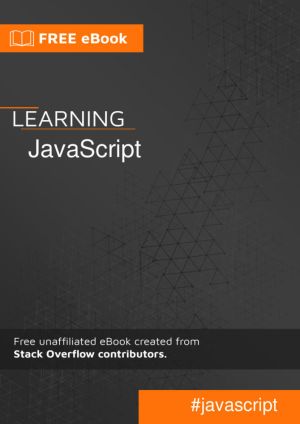
JavaScript is a programming language that conforms to the ECMAScript specification. It is an unofficial and free JavaScript ebook created for educational purposes. All the content is extracted from Stack Overflow Documentation, which is written by many hardworking individuals at Stack Overflow....
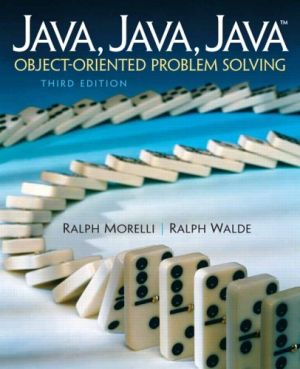
Functional and flexible, this guide takes an objects-first approach to Java programming and problem using games and puzzles. Offers independent introductions to both a command-line interface and a graphical user interface (GUI). Features coverage of Unified Modeling Language (UML), the industry-standard, object-oriented design tool. Illustrates key...
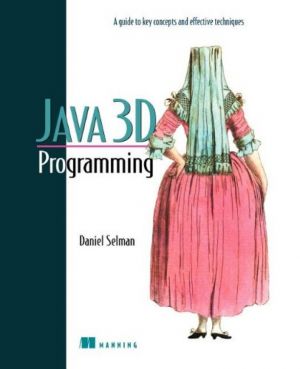
Java 3D Programming steps programmers through the important design and implementation phases of developing a successful Java 3D application. The book provides invaluable guidance on whether to use Java 3D, user interface design, geometry creation, scene manipulation and final optimizations. The book does not attempt to exhaustively cover the API or...

Love it or hate it, JavaScript is avidly eating the world of software development. From web sites and apps to servers, smartphones and connected objects, JavaScript is everywhere. It has evolved from a niche scripting tool crafted in a few days into a modern, multi-purpose language sitting on top of a rich ecosystem and a vibrant developer communit...
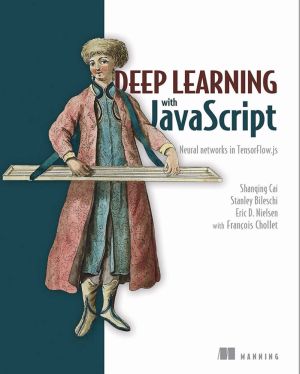
Deep learning has transformed the fields of computer vision, image processing, and natural language applications. Thanks to TensorFlow.js, now JavaScript developers can build deep learning apps without relying on Python or R. Deep Learning with JavaScript shows developers how they can bring DL technology to the web. Written by the main authors of t...

This book presents a synopsis of six emerging themes in adult mathematics/numeracy and a critical discussion of recent developments in terms of policies, provisions, and the emerging challenges, paradoxes and tensions. It also offers an extensive review of the literature adult mathematics education. Why do adults want to learn mathematics? Did they...

